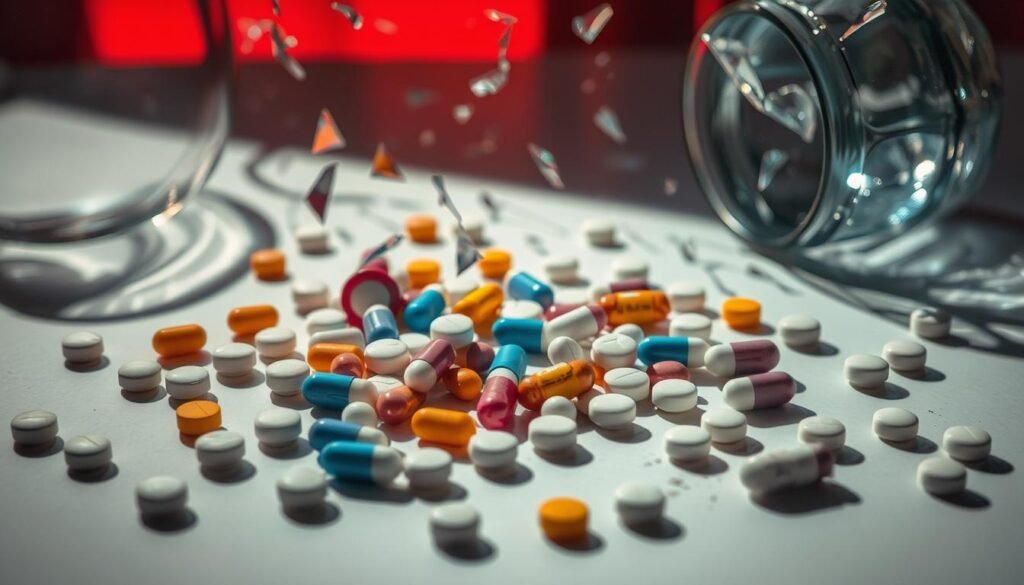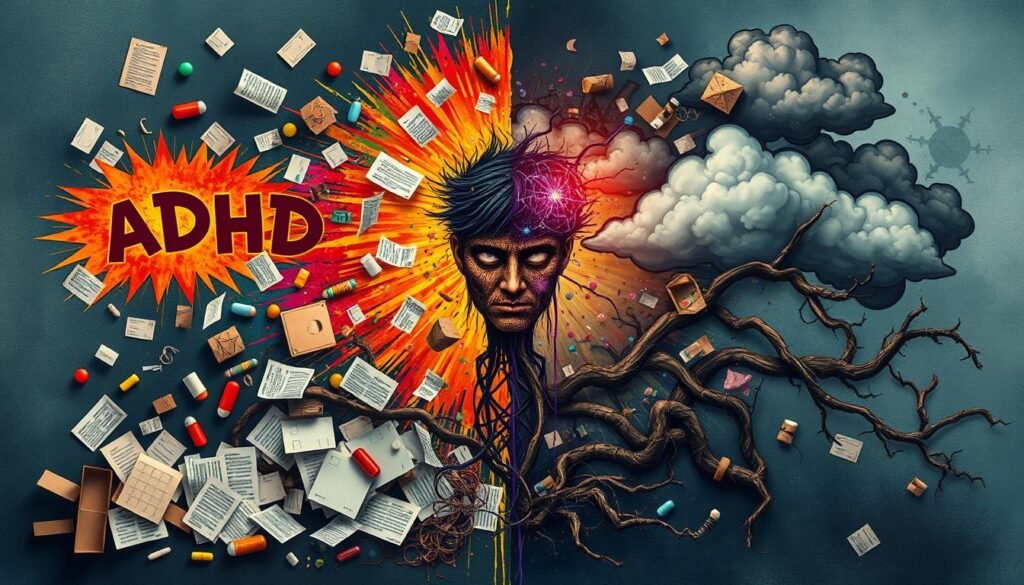Can ADHD medications help with focus but make anxiety and depression worse? This is a question many adults with ADHD are asking.
ADHD affects adults too, not just kids. It causes trouble focusing, impulsiveness, and lots of energy. These symptoms can make everyday life hard. They often come with anxiety and depression. A 2013 study by The American Academy of Pediatrics found that 30-50% of people with ADHD also have anxiety. And since around 30% of adults will face anxiety, figuring out ADHD treatments is very important. This article will talk about the best ADHD medicines for adults who also have anxiety and depression.
We’re going to look at different treatments, including medicines. We’ll talk about their side effects and ways to cope that help many adults. Learning about ADHD treatment options helps us understand it better. This can lead to a more balanced and happy life for those affected.
Key Takeaways
- ADHD often coexists with anxiety and depression in adults.
- The right ADHD medication can help alleviate symptoms of both ADHD and anxiety disorders.
- Understanding medication options, including stimulants and non-stimulants, is crucial for effective ADHD treatment.
- Combination therapies, such as psychotherapy and medication, can enhance overall mental health management.
- Recognizing common side effects is vital for adults starting on ADHD medications.
- Non-medication approaches like cognitive-behavioral therapy offer additional support.
The Connection Between ADHD, Anxiety, and Depression
Research shows a big link between ADHD and managing anxiety and depression. About 50% of adults with ADHD also have anxiety disorders. This can greatly affect their lives, work, and relationships. Anxiety symptoms often happen almost daily, making things harder for people with ADHD.
The stress from ADHD can lead to a cycle of stress and feeling not good enough, which can cause depression. This cycle is clear because anxiety usually starts young in people with ADHD. Then, as they get older, they might feel more depressed. Kids with ADHD might find school hard or have trouble with friends. This can lead to feeling hopeless and showing signs of depression.
When it comes to treatment, doctors use a mix of medicine and therapy. Stimulants like methylphenidate and amphetamines are common for ADHD. But they might make anxiety worse for some people. So, doctors might suggest non-stimulant drugs, like atomoxetine or viloxazine, especially if you have both ADHD and anxiety.
Those dealing with both depression and ADHD often have a family history of these issues. This makes treatment more complex. It’s key to understand how these disorders interact. Only then can we find the best way to help improve the lives of those affected.
Understanding Adult ADHD Symptoms
Adult ADHD symptoms might look different from those seen in kids. Many adults find it tough to pay attention, control their impulses, and keep things organized. These issues can affect their jobs, personal relationships, and how they feel about themselves. It’s important to recognize and understand these symptoms to manage them better.
Some common signs of ADHD in adults include:
- Not performing consistently at work
- Often losing things or being disorganized
- Having trouble finishing tasks
- Struggling to stick to schedules
Adults with ADHD often feel frustrated, guilty, and constantly worried. They may also deal with other mental health issues like anxiety and depression. This can make finding the right treatment more complex. It’s crucial to identify the best ADHD medication for adults with anxiety and depression.
Getting diagnosed usually involves thorough exams and psychological tests. Symptoms appear before age 12 and last into adulthood. Knowing these symptoms exists can help find the right treatment. This might include medicine, therapy, and support groups.
| Symptom | Potential Impact |
|---|---|
| Poor Attention | Hard time focusing or completing tasks |
| Impulsivity | Difficulty controlling urges, making quick decisions |
| Disorganization | Hard to keep tasks and time in order |
| Emotional Dysregulation | More likely to feel frustrated and anxious |
With good strategies and support, people can manage adult ADHD symptoms better. Using cognitive behavioral therapy and mindfulness can improve daily life. This helps increase well-being and functionality.
Best ADHD Medication for Adults with Anxiety and Depression
Treatment for ADHD often includes meds that help control symptoms. The best ADHD medication for adults with anxiety and depression depends on individual needs. Knowing the different types of meds available is key for a good treatment plan.
Stimulant Medications
Stimulant meds like Ritalin, Concerta, Adderall, and Vyvanse, are top choices for ADHD. They boost dopamine and norepinephrine levels in the brain. This improves focus and lowers impulsivity. However, they might make anxiety worse for some people.
- Common benefits of stimulant medications include:
- Boosted concentration and focus
- Less hyperactive and impulsive behavior
- Potential side effects may include:
- Feeling restless
- Trouble sleeping
- Less appetite
- Headaches
- Mood changes
Because of the potential to increase anxiety, getting medical advice before starting stimulants is crucial.
Non-Stimulant Options
If stimulants don’t work well for someone, non-stimulant meds like Strattera and Qelbree offer an alternative. They focus on norepinephrine levels to help symptoms without as much risk of anxiety.
Other non-stimulant options include:
- Wellbutrin (Bupropion): Used off-label for ADHD, it affects both norepinephrine and dopamine. It’s helpful for adults with anxiety and depression.
- Blood pressure medications (Kapvay and Intuniv): These can help with hyperactivity and impulsivity. But they are not as good at improving attention.
Choosing the best treatment depends on symptom severity and other existing conditions. Both stimulant and non-stimulant options help manage ADHD symptoms, anxiety, and depression.
ADHD Treatment Options Available
There are many ways to treat ADHD, all tailored to meet personal needs. A combined strategy helps manage symptoms and other conditions like anxiety or depression. Cognitive-behavioral therapy (CBT) is a key part of this approach, helping people fight negative thoughts.
Medications play a big role too. ADHD treatments can include medications like methylphenidate and atomoxetine. Stimulant medications, especially methylphenidate, are often tried first. For those with anxiety and depression, atomoxetine and other non-stimulants might be better. They are less likely to make anxiety worse, helping manage anxiety and depression better.
Making changes in your lifestyle is also crucial for treating ADHD. Setting up routines helps manage symptoms. Learning ways to handle stress improves well-being. Behavioral therapy can also help caregivers and families learn the best ways to support their loved ones.
Other treatments like diet changes and supplements need careful consideration. It’s best to talk with a healthcare provider before trying things like omega-3 and omega-6. They can guide safe and smart choices about treatment options.

| Medication | Type | Common Side Effects |
|---|---|---|
| Methylphenidate | Stimulant | Increased heart rate, loss of appetite, trouble sleeping |
| Lisdexamfetamine | Stimulant | Decreased appetite, dizziness, drowsiness |
| Dexamfetamine | Stimulant | Mood swings, agitation, dizziness |
| Atomoxetine | Non-Stimulant | Nausea, stomach aches, difficulty sleeping |
| Guanfacine | Non-Stimulant | Tiredness, headache, dry mouth |
Finding the right ADHD treatment takes time and teamwork with doctors. Combining therapy and medication often works best, especially for those also dealing with anxiety or depression. This approach offers a fuller path to better mental health.
For more details on ADHD treatments, check out this resource.
Anxiety and Depression Management in Adults
Dealing with anxiety and depression in adults involves looking at ADHD and other health issues. Many people with ADHD also struggle with anxiety and depression. This makes their care more complex. Getting the right kind of help can really make a difference, using a mix of good strategies.
Identifying Co-morbid Conditions
It’s important to know about other conditions that come with anxiety and depression. Studies show that adults with ADHD often have other mental health issues too. Around 81% have one more diagnosis, and more than 56% have at least two. These can include anxiety, mood disorders, and substance use problems. Spotting these issues helps create better treatment plans for each person.
Psychotherapy and Medication Integration
Using psychotherapy and medicine together works well for treating anxiety and depression. Adding cognitive-behavioral therapy (CBT) to medicine helps care for the whole person. It deals with symptoms and the deeper psychological issues linked to ADHD and other conditions. Making lifestyle changes adds to the improvements. Things like regular exercise, eating right, and spending time outdoors can really boost your mood. By looking at mental health and lifestyle together, adults get complete care for anxiety and depression.
ADHD Medication Side Effects
Knowing the possible side effects of ADHD medication is key. These treatments can help with focus but may have downsides. It’s important to balance these with the benefits, especially for adults with anxiety and depression.
Common Side Effects of Stimulants
Stimulant meds, the top choice for ADHD, work well 70%-80% of the time. Yet, they have a risk for addiction since they’re Schedule I drugs. Common downsides include:
- Dry mouth
- Headache
- Loss of appetite
- Weight loss
- Trouble sleeping
- Upset stomach
- Nervousness
Side effects might affect sticking with treatment. It’s key to talk about them with a doctor.
Understanding Non-Stimulant Side Effects
Non-stimulant meds have lower addiction risks. They’re often picked for those sensitive to stimulants or with heart issues. Their common side effects can include:
- Constipation
- Upset stomach
- Headache
- Insomnia
- Decreased libido
- Fatigue
- Increased heart rate and blood pressure

Identifying these side effects is vital for creating a treatment plan that fits, ensuring good ADHD management.
| Medication Type | Common Side Effects | Addiction Potential |
|---|---|---|
| Stimulants | Dry mouth, insomnia, weight loss, increased heart rate | High |
| Non-Stimulants | Constipation, fatigue, decreased libido | Low |
Non-Stimulant ADHD Medications
Non-stimulant ADHD medications are another option for those who don’t do well with stimulants. They are especially good for adults with ADHD who also have anxiety or depression.
Atomoxetine and Its Benefits
Atomoxetine, known as Strattera, is a non-stimulant medicine approved for ADHD. It helps improve focus and reduce impulsivity by targeting norepinephrine. It’s ideal for those with anxiety, as it doesn’t cause the stimulation that could make anxiety worse. But, it might cause sleepiness, dry mouth, or nausea.
Other Non-Stimulant Options
Apart from atomoxetine, there are other non-stimulant treatments for adults with ADHD:
- Viloxazine (Qelbree): This new option helps both children and adults. It enhances attention and curbs impulsive actions.
- Guanfacine (Intuniv): Initially for blood pressure, it’s effective for ADHD symptoms and improving impulse control.
- Clonidine (Kapvay): Similar to guanfacine, it aids in ADHD management and boosts working memory.
These non-stimulant medications are usually considered after other treatments. They’re smoother for those sensitive to stimulants, offering fewer risks of agitation or sleep issues. They are a good choice for people with anxiety and depression.
| Medication | Type | Efficacy Response Rate | Common Side Effects |
|---|---|---|---|
| Atomoxetine (Strattera) | Non-Stimulant | Approximately 50% | Sleepiness, dry mouth, nausea |
| Viloxazine (Qelbree) | Non-Stimulant | 55-60% | Headache, dizziness, sleepiness |
| Guanfacine (Intuniv) | Alpha Agonist | 55-60% | Drowsiness, dry mouth, fatigue |
| Clonidine (Kapvay) | Alpha Agonist | 55-60% | Fatigue, dizziness, dry mouth |
ADHD and Comorbid Conditions
ADHD often goes hand in hand with other mental health challenges. Many adults with ADHD also struggle with anxiety, depression, and substance abuse. It’s important to address all these issues together for effective treatment. Not dealing with them can make recovery harder and affect life quality.
Studies show a link between ADHD and depression. Research with over 38,000 people in Sweden found ADHD medication can lower depression risk. The study showed those on ADHD meds had a 20% lower chance of depression. This means treating ADHD well can also help manage depression and anxiety.
Dealing with ADHD and its related conditions requires a complete treatment plan. It’s about understanding how ADHD affects other mental health issues. Treatment might include medications like methylphenidate or atomoxetine, along with therapy. This approach aims to improve overall well-being.

| Statistic | Value |
|---|---|
| Estimated prevalence of ADHD in adults | 2.5% |
| Adults with ADHD and comorbid conditions | ~80% |
| Reduction in depression occurrence with ADHD medication | 20% |
| Average income reduction for adults with ADHD | $8,900 to $15,400 annually |
| Increased likelihood of divorce in adults with ADHD | 28% |
Understanding and managing ADHD alongside other conditions is key to improving life. Proper treatment helps people with ADHD in personal and financial ways. It makes the future look brighter for those seeking help with ADHD and mental health.
ADHD Coping Strategies and Management Techniques
Managing ADHD means using smart coping techniques. About 8 million adults in the U.S. live with ADHD. For them, having a daily routine and simplifying tasks can really help. Management techniques that suit their needs can change their lives for the better.
*Mindfulness practice* keeps you focused and eases anxiety. Working out boosts dopamine which helps with memory and restlessness. A steady fitness plan lowers anxiety and improves both memory and behavior.
Time management is key for adults. Using a timer for short periods helps focus on the task at hand. This way, they can handle distractions from social media, emails, and noise better. A tidy workspace also boosts concentration.
Using cognitive-behavioral techniques is also effective. This helps change negative thoughts into positive actions. Support groups are great for community and finding new coping skills.
For more on ADHD treatment, combining medications with therapies like CBT is beneficial. This combo improves symptom control. For more on medication, check this helpful resource.
| ADHD Coping Strategy | Description | Benefits |
|---|---|---|
| Mindfulness Practice | Focused attention on the present moment. | Reduces anxiety and improves concentration. |
| Structured Routines | Consistent daily schedules to follow. | Enhances time management and reduces chaos. |
| Cognitive Behavioral Techniques | Identifying and changing unhelpful thoughts. | Helps improve emotional regulation and self-management. |
| Physical Exercise | Engaging in regular fitness activities. | Increases dopamine production, reducing anxiety. |
| Utilizing Timers | Setting timers for focused work periods. | Aids in maintaining focus and managing distractions. |
Conclusion
Adults with ADHD and related conditions like anxiety and depression have unique challenges. It’s crucial to look for treatment options that match their specific needs. Knowing how these conditions connect helps pick the best ADHD medication. Stimulant and non-stimulant drugs, along with antidepressants, are key in this process.
When regular treatments don’t work or if someone has hard-to-treat depression, psychostimulants could help. They may better mood, energy, and focus. Adding psychotherapy, like Cognitive Behavioral Therapy, is powerful. It gives tools to handle anxiety and depression. Lifestyle habits such as exercise and mindfulness also play a significant role in improving mental health.
Talking openly with doctors, keeping track of symptoms, and using tools like the Do I Have Anxiety Test are key steps for early detection and treatment. It’s important to actively manage ADHD and its associated issues. This approach helps in pursuing long-lasting mental well-being and a more balanced life.